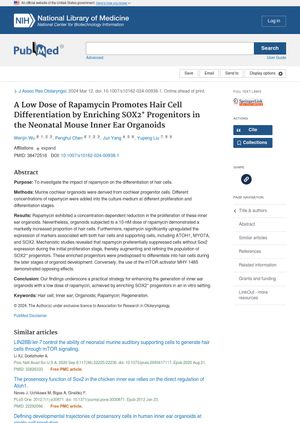A Low Dose of Rapamycin Promotes Hair Cell Differentiation by Enriching SOX2+ Progenitors in Neonatal Mouse Inner Ear Organoids
March 2024
in “
PubMed
”

TLDR A low dose of rapamycin increases inner ear hair cell creation by boosting SOX2+ cell numbers.
The study investigated the impact of rapamycin on hair cell differentiation in murine cochlear organoids. The results showed that rapamycin reduced the proliferation of these organoids in a concentration-dependent manner. However, a 10-nM dose of rapamycin significantly increased the proportion of hair cells and upregulated the expression of markers associated with hair cells and supporting cells, including ATOH1, MYO7A, and SOX2. The study found that rapamycin preferentially suppressed cells without Sox2 expression during the initial proliferation stage, thereby enriching the population of SOX2+ progenitors. These enriched progenitors were more likely to differentiate into hair cells during the later stages of organoid development. The study concluded that a low dose of rapamycin could be a practical strategy for enhancing the generation of inner ear organoids by enriching SOX2+ progenitors.




